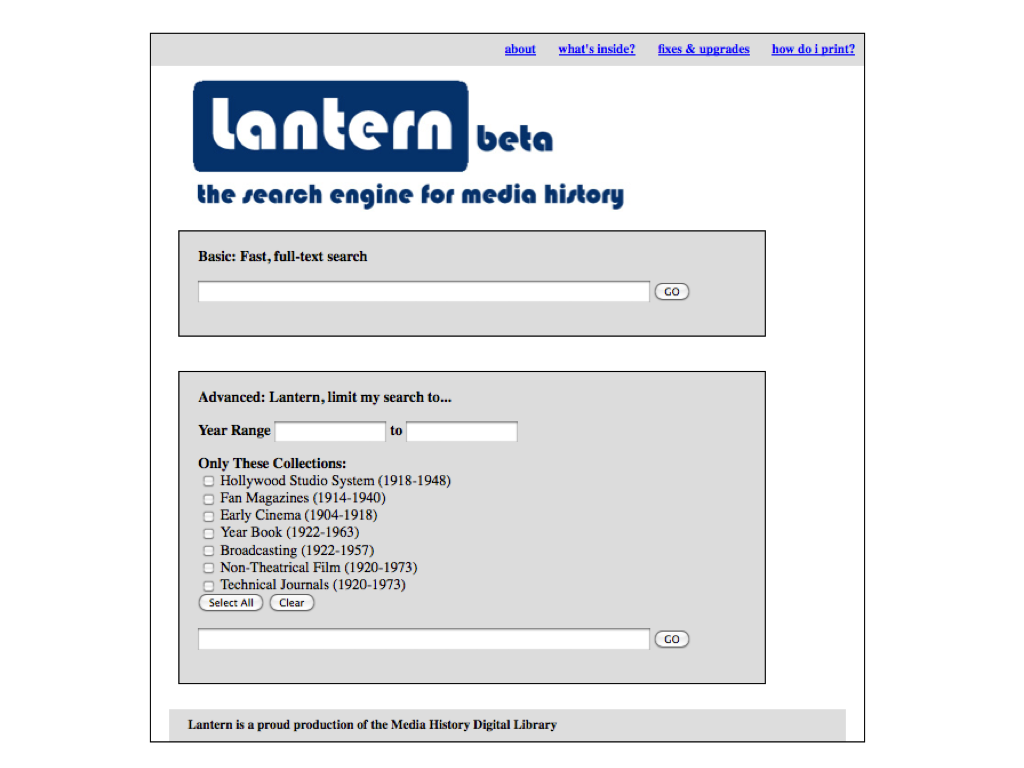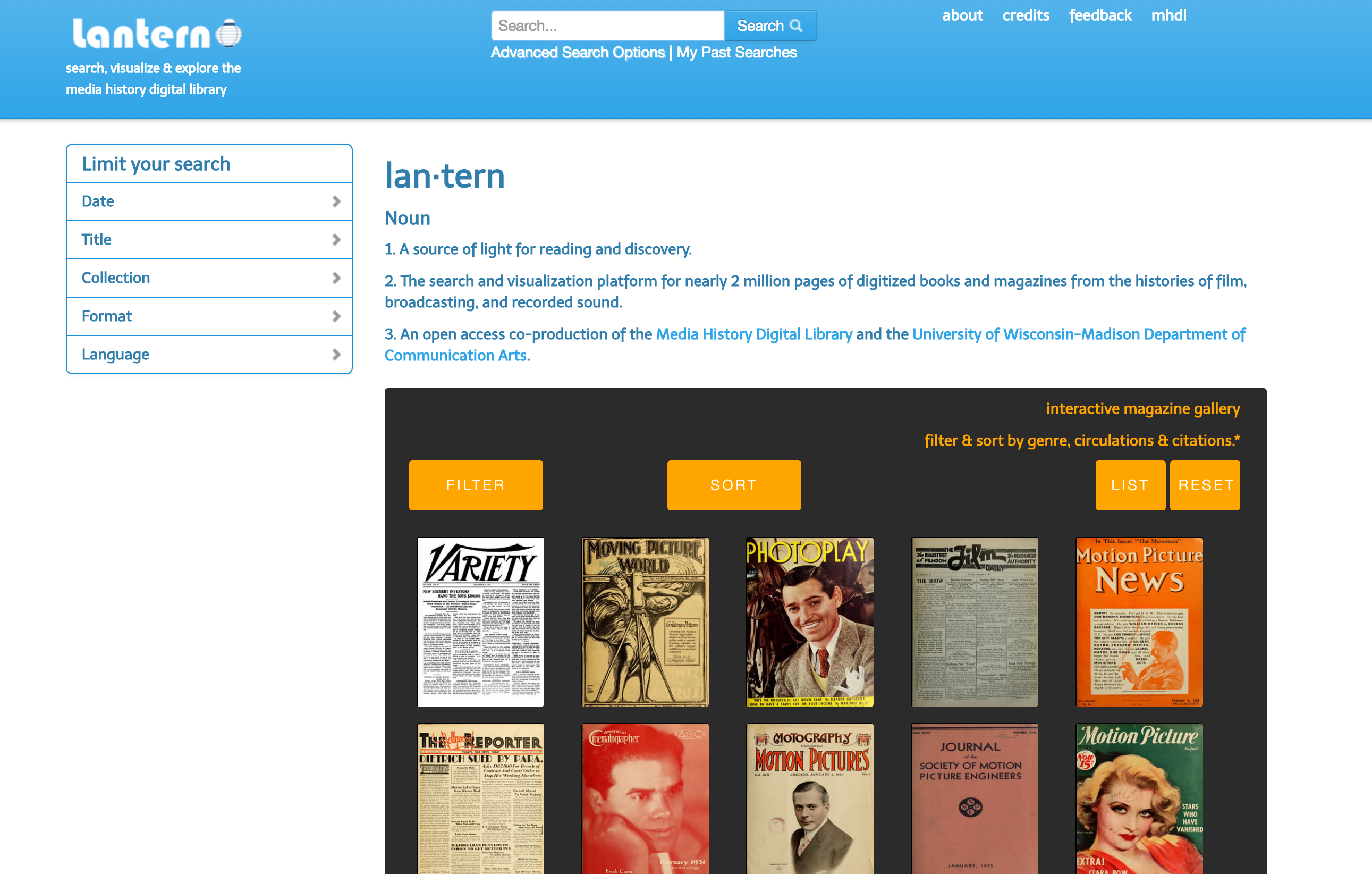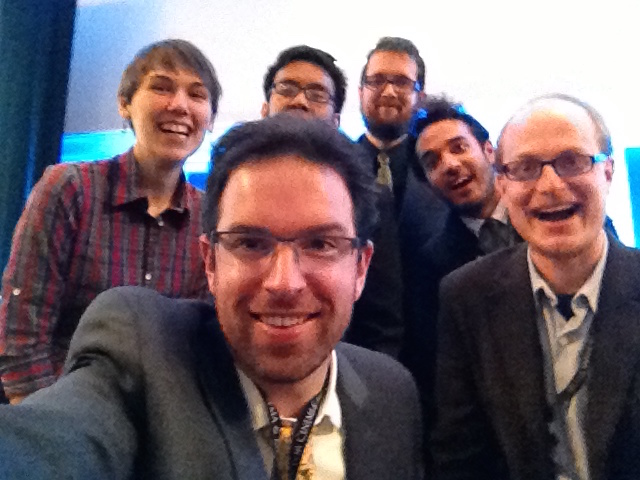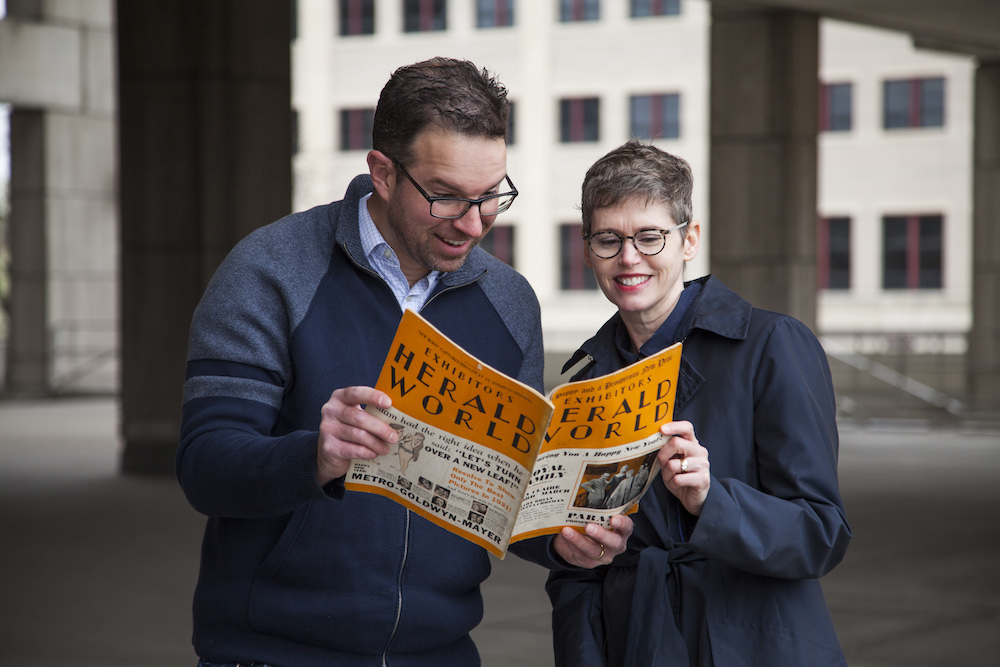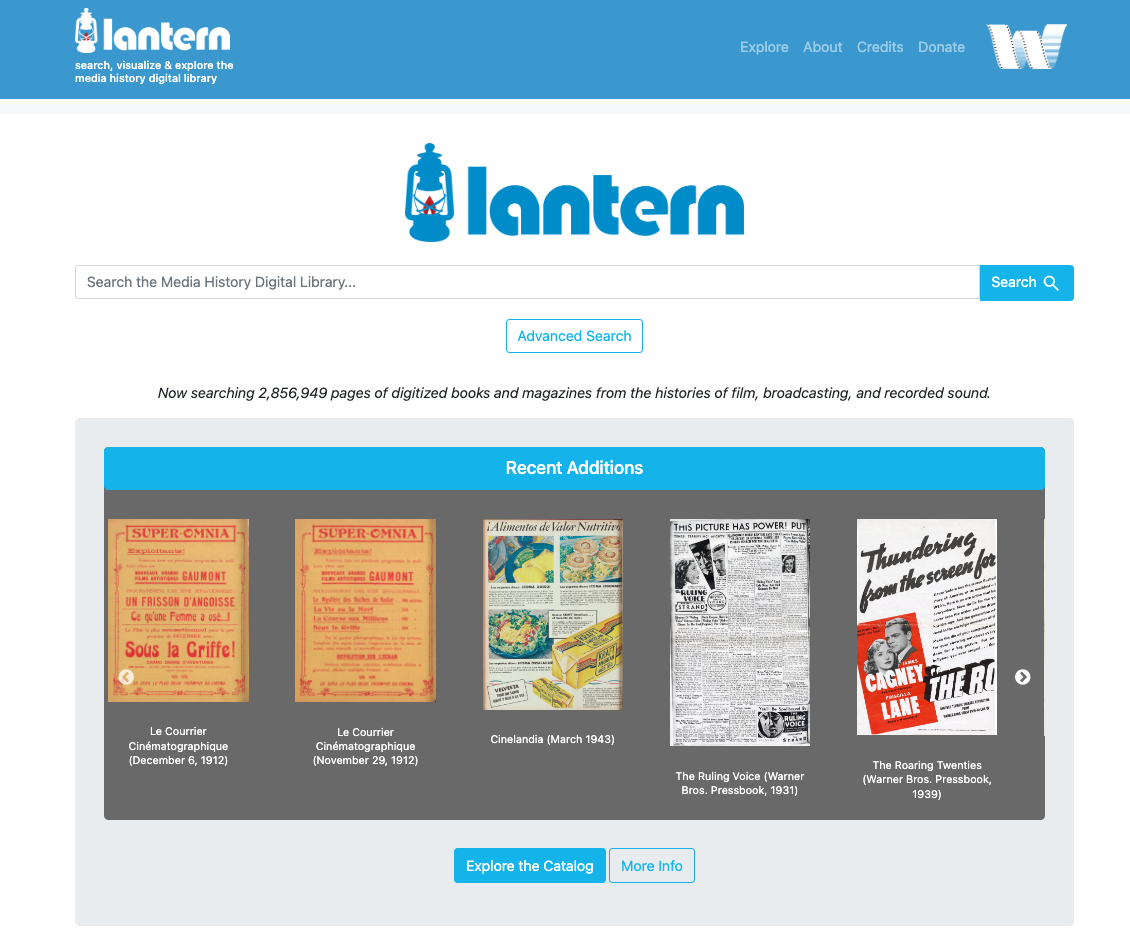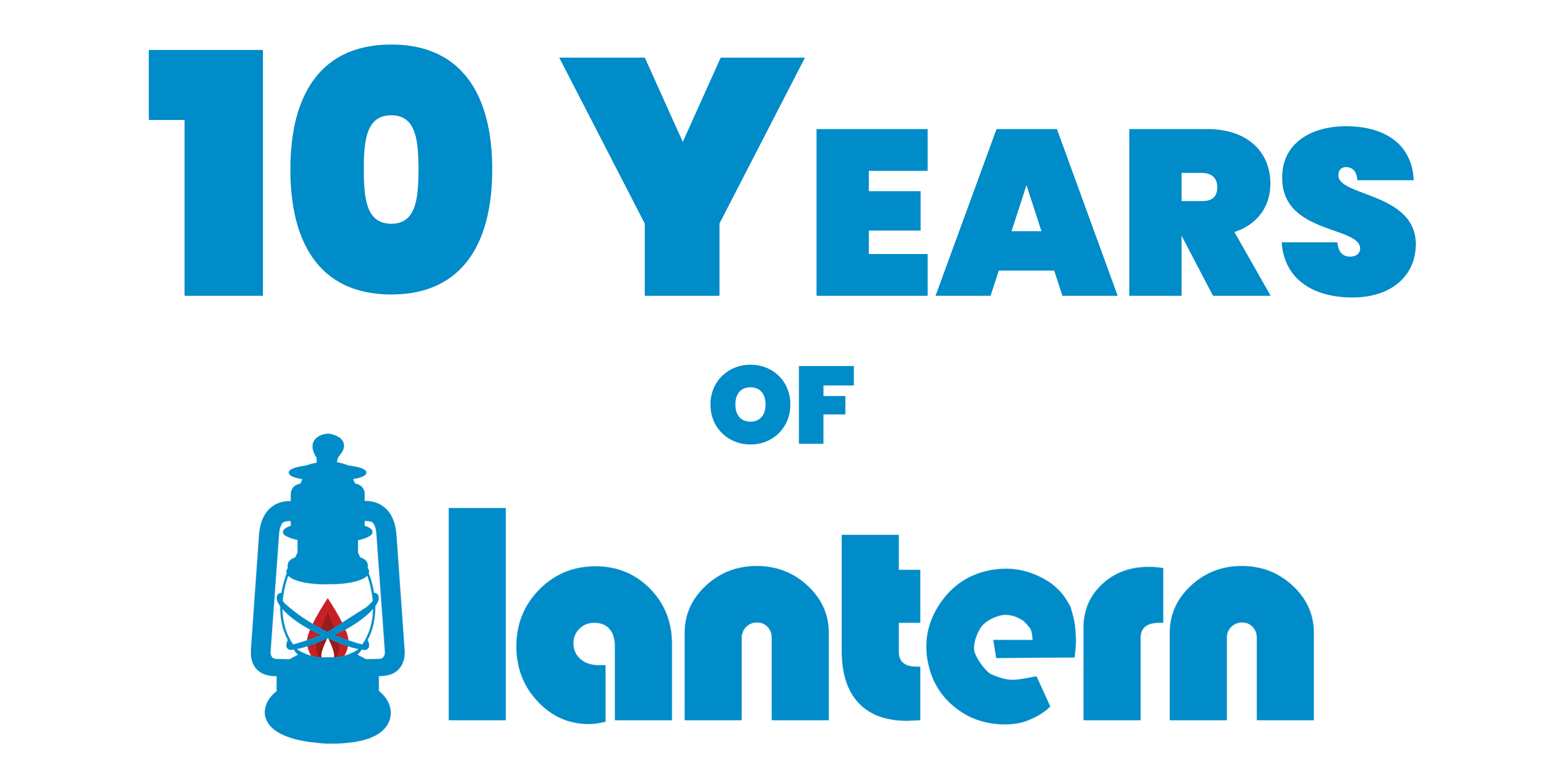We love hearing about how Lantern has been used to support research projects of all kind. Knowing that our website has helped enable so much groundbreaking scholarship. While not exhaustive, this list represents the breadth of work that has been made possible by Lantern. If you'd like your work to appear on this list, please submit that information via our Lantern Usage Survey or let us know by emailing mhdl@commarts.wisc.edu.
Carman, Emily. “"Film History Comes Alive: Primary Materials Research as Participatory Pedagogy.” Edited by Laura Isabel Serna and Kate Fortmueller. Cinema Journal Teaching Dossier 4, no. 3 (June 2017).
Carman, Emily. Independent Stardom: Freelance Women in the Hollywood Studio System. Texas Film and Media Studies Series. Austin: University of Texas Press, 2016.
Curtis, Scott, Philippe Gauthier, Tom Gunning, and Joshua Yumibe, eds. “Advertising with Moving Pictures: International Harvester’s The Romance of the Reaper (1910-1913).” In
The Image in Early Cinema: Form and Material, 194–202. Bloomington, Indiana: Indiana University Press, 2018.
https://doi.org/10.2307/j.ctv6p40j.
Flueckiger, Barbara. “Timeline of Historical Film Colors,” 2012.
https://filmcolors.org/.
Gates, Philippa. “Controlling Racism: The Production Code Administration and the Representation of Chinese/Americans.” In Resetting the Scene: Classical Hollywood Revisited, edited by Philippa Gates and Katherine Spring, 155–68. Contemporary Approaches to Film and Media Series. Detroit: Wayne State University Press, 2021.
Gates, Philippa. Criminalization/Assimilation: Chinese/Americans and Chinatowns in Classical Hollywood Film. New Brunswick, New Jersey: Rutgers University Press, 2019.
Gates, Philippa. “Crossing America’s Borders: Chinese Immigrants in the Southwesterns of the 1920s and 1930s.”
Journal of Film and Video 69, no. 4 (December 1, 2017): 3–17.
https://doi.org/10.5406/jfilmvideo.69.4.0003.
Gates, Philippa. Detecting Women: Gender and the Hollywood Detective Film. Albany: SUNY Press, 2011.
Gates, Philippa. “Objects of an Orientalist Gaze: Chinese Immigrants in American Silent Film.” In Asian American Literature in Transition, 1850-1930, edited by Josephine Lee and Julia H. Lee, 1:121–35. Asian American Literature in Transition. Cambridge, United Kingdom ; New York, NY: Cambridge University Press, 2021.
Gates, Philippa. “The Wild (North)West: Chinese Immigration, Crime, and the Canadian Border in Film.” In Screening Justice: Canadian Crime Films, Culture and Society, edited by Pauline Greenhill, Steven A. Kohm, and Sonia Bookman, 22–39. Halifax: Fernwood Publishing, 2016.
Horak, Jan-Christopher, and Andréas-Benjamin Seyfert, eds. Enchanted by Cinema: Wilhelm Thiele Between Vienna, Berlin, and Hollywood. New York: Berghahn Books, 2023.
Hughes, Kit. “Developing the Student-Citizen of Finance: Sponsored Film at The New York Stock Exchange, 1947-1973.” Historical Journal of Film, Radio and Television 40, no. 2 (2020): 325–48.
Hughes, Kit. ““Disposable: Useful Cinema on Early Television.” Critical Studies in Television 12, no. 2 (2017): 102–20.
Hughes, Kit. “Field Sketches with Arclight: Mapping the Industrial Film Sector;” In Arclight Guidebook to Media History and the Digital Humanities, edited by Eric Hoyt and Charles Acland. Sussex: REFRAME Books, 2016.
Hughes, Kit. “‘For Pete’s Sake, I’m Not Trying to Entertain These People’: Film and Franchising at International Harvester.” Film History 27, no. 3 (2015): 41–72.
Hughes, Kit. “Market Research as Portraiture: Thomas Hope Sketches the Audiovisual Industry” 19, no. 2 (2020): 1–25.
Hughes, Kit. “Reconsidering the Network Era: 16mm Film on Television.” Journal of Cinema and Media Studies 62, no. 2 (2023): 177–82.
Hughes, Kit. “Record/Film/Book/Interactive TV: EVR as Threshold Format.” Television & New Media 17, no. 1 (2016): 44–61.
Hughes, Kit. Television at Work: Industrial Media and American Labor. Oxford, UK: Oxford Uninversity Press, 2020.
Hughes, Kit, Eric Hoyt, Derek Long, Kevin Ponto, and Tony Tran. ““Hacking Radio History’s Data: Station Call Signs, Digitized Magazines, and Scaled Entity Search.” Media Industries Journal 2, no. 2 (2015).
Maltin, Leonard. Hooked on Hollywood: Discoveries from a Lifetime of Film Fandom. Pittsburgh, Pennsylvania: GoodKnight Books, 2018.
Maltin, Leonard. Leonard Maltin’s 2014 Movie Guide: The Modern Era. New York: Plume Books, 2013.
Maltin, Leonard. Starstruck: My Unlikely Road to Hollywood. Pittsburgh, Pennsylvania: GoodKnight Books, an imprint of Paladin Communications, 2021.
Maltin, Leonard. Turner Classic Movies Presents Leonard Maltin’s Classic Movie Guide: From the Silent Era Through 1965: Third Edition. Edited by Rob Edelman, Spencer Green, Leonard Maltin, Michael Scheinfeld, Casey St. Charnez, and Tom Weaver. 3rd edition. New York, New York: Plume, an imprint of Penguin Random House LLC, 2015.
McLean, Adrienne L. All for Beauty: Makeup and Hairdressing in Hollywood’s Studio Era. New Brunswick, New Jersey: Rutgers University Press, 2022.
McLean, Adrienne L, ed. Costume, Makeup, and Hair. Behind the Silver Screen. New Brunswick, New Jersey: Rutgers University Press, 2016.
McLean, Adrienne L. “En Toute Impunité”: La Production Code Administration et Le Corps Dansant» [‘We Got Away with Murder’: The Production Code Administration and the Dancing Body].” In Politiques Du Musical Hollywoodien, edited by Aurélie Ledoux and Pierre-Olivier Toulza, 79–98. Nanterre: Presses universitaires de Paris Nanterre, 2020.
McLean, Adrienne L. “Give Them a Good Breakfast Says Nancy Carroll’: Fan Magazine Advice Across Time.” In Star Attractions: Twentieth-Century Movie Magazines and Global Fandom, edited by Tamar Jeffers McDonald and Lies Lanckman, 11–28. Fandom & Culture. Iowa City: University of Iowa Press, 2019.
McLean, Adrienne L. “«Le Glamour et Le Corps Dansant Dans La Comédie Musicale Hollywoodienne» [Glamour and the Dancing Body in the Hollywood Musical].” In Le Musical Hollywoodien: Histoire, Esthétique, Création, edited by N. T. Binh and José Moure, 157–84. Caméras Subjectives. Bruxelles: Les Impressions nouvelles, 2021.
McLean, Adrienne L. “Makeup and Hair: Forgotten Folks and Famous Experts.” In Hollywood Unions, edited by Kate Fortmueller and Luci Marzola. New Brunswick, New Jersey: Rutgers University Press, Forthcoming.
McLean, Adrienne L. “Managing the Classical Hollywood Musical’s Dancing Bodies: ‘Morality’ and Glamour.” In Oxford Handbook on American Film History, edited by Jon Lewis. Oxford, UK: Oxford University Press, Forthcoming.
McLean, Adrienne L. “The Faces of Ginger: Beauty Makeup, Facial Acting and Hollywood Stardom.” In Faces on Screen: New Approaches, edited by Alice Maurice. Edinburgh: Edinburgh University Press, 2022.
Moore. “‘Bought, Sold, Exchanged and Rented’: The Early Film Exchange and the Market in Secondhand Films in New York Clipper Classified Ads.”
Film History 31, no. 2 (2019): 1.
https://doi.org/10.2979/filmhistory.31.2.01.
Moore, Paul S. “A ‘Distant Reading’ Of The ‘Chaser Theory’: Local Views And The Digital Generation Of New Cinema History.” In
Technology and Film Scholarship, edited by Santiago Hidalgo and André Gaudreault, 169–92. Amsterdam University Press, 2017.
https://doi.org/10.1515/9789048525270-010.
Moore, Paul S. “Narrative Cinema as a Separate Attraction: Archie L. Shepard’s Newspaper Publicity.” In
New Perspectives on Early Cinema History: Concepts, Approaches, Audiences, edited by Mario Slugan and Daniël Biltereyst, 1st ed. Bloomsbury Publishing Plc, 2022.
https://doi.org/10.5040/9781350182004.
Moore, Paul S. “Paramount Pictures, National Advertising Agencies, and the Conspicuous Distribution of First-Run Feature Films in the United States.” In The Oxford Handbook of Silent Cinema, edited by Charlie Keil and Rob King. Oxford Handbooks. Oxford, New York: Oxford University Press, 2024.
Navarro, Gabriel. “There Are No Hispanic Stars!”: Collected Writings of a Latino Film Critic in Hollywood 1921-1939. Edited by Colin Gunckel and Laura Isabel Serna. Los Angeles: UCLA Chicano Studies Research Center Press, 2023.
Scheibel, Will. Gene Tierney: Star of Hollywood’s Home Front. Contemporary Approaches to Film and Media. Detroit: Wayne State University Press, 2022.
Serna, Laura Isabel. “Atmosphere.: Mexican Extras and the Production of Race in Silent Hollywood.” Journal of Cinema and Media Studies 63, no. 2 (2023).
Serna, Laura Isabel. “Cine-Mundial: Circuits of Culture in the First Half of the 20th Century.” In Moving Image Periodicals: Histories, edited by Eric Hoyt and Kelley Conway, Forthcoming.
Serna, Laura Isabel. “Estudios Churubusco: A Transnational Studio for a National Industry.” In In the Studio: Visual Creation and Its Material Environments, edited by Brian Jacobson. Berkeley, Calif.: University of California Press, 2020.
Shepperd, Josh. Shadow of the New Deal: The Victory of Public Broadcasting. The History of Media and Communication. Champaign, Illinois: University of Illinois Press, 2023.
Szczepaniak-Gillece. “Bombed Pasts, Burning Futures: Notes on Demolition and Exhibition.”
Framework: The Journal of Cinema and Media 62, no. 2 (2021): 172.
https://doi.org/10.13110/framework.62.2.0172.
Szczepaniak-Gillece, Jocelyn. “Harry Anslinger Goes to the Movies: To the Ends of the Earth.” Points: Joint Blog of the Alcohol & Drugs History Society and the American Institute of the History of Pharmacy (blog), May 20, 2021.
Szczepaniak-Gillece, Jocelyn. Movies Under the Influence. Minneapolis: University of Minnesota Press, Forthcoming.
Szczepaniak-Gillece, Jocelyn. “Operatic Optics: The Luxury of Listening in American Art House Exhibition.” In Oxford Handbook on Cinematic Listening, edited by Carlo Genciarelli, 156-17-. Oxford, UK: Oxford University Press, 2021.
Szczepaniak-Gillece, Jocelyn. “Revisiting the Apparatus: The Theatre Chair and Cinematic Spectatorship.”
Screen 57, no. 3 (September 2016): 253–76.
https://doi.org/10.1093/screen/hjw030.
Szczepaniak-Gillece, Jocelyn. “Smoke and Mirrors: Cigarettes, Cinephilia, and Reverie in the American Movie Theater.”
Film History 28, no. 3 (2016): 85.
https://doi.org/10.2979/filmhistory.28.3.05.
Szczepaniak-Gillece, Jocelyn. “Technologies of Blackness: Aldo Tambellini, Psychedelia, Widescreen, Media.”
Cultural Critique 112, no. 1 (June 2021): 59–92.
https://doi.org/10.1353/cul.2021.a790984.
Szczepaniak-Gillece, Jocelyn. The Optical Vacuum: Spectatorship and Modernized American Theater Architecture. New York: Oxford University Press, 2018.
Tepperman, Charles. “‘A Recognized Screen’: The New York Annual Movie Parties from Parlor to Public.”
Film History 30, no. 1 (2018): 58.
https://doi.org/10.2979/filmhistory.30.1.04.
Tepperman, Charles. “Amateur Cinema.” Amateur Cinema, 2023.
http://amateurcinema.org/.
Tepperman, Charles. Amateur Cinema: The Rise of North American Moviemaking, 1923-1960. Berkeley, Calif.: University of California Press, 2015.
Tepperman, Charles. “Margaret’s World: The Creative Geography of an Amateur Filmmaker.” In Submitted for Publication in Cinema in the Eye of the Collector, edited by André Habib, Santiago Hidalgo, Louis Pelletier, and Jean-Pierre Sirois-Trahan. Amsterdam: Amsterdam University Press, Forthcoming.
Tepperman, Charles. “The Complex Materiality of Amateur Cinema Research: Texts, Archives and Digital Methods Introduction.”
Screen 61, no. 1 (March 1, 2020): 119–23.
https://doi.org/10.1093/screen/hjaa006.
Waller, Gregory. Beyond the Movie Theater: Sites, Sponsors, Uses, Audiences. Berkeley, Calif.: University of California Press, 2023.
Waller, Gregory. “Institutionalizing Educational Cinema in the United States during the Early 1920s.” In
The Institutionalization of Educational Cinema: North America and Europe in the 1910s and 1920s, edited by Marina Dahlquist and Joel Frykholm, 220–50. Bloomington, Indiana: Indiana University Press, 2019.
https://doi.org/10.2307/j.ctvs89dg2.
Waller, Gregory. “Nonfiction Film in and out of the Moving Picture Theater: Roosevelt in Africa (1910).” In
A Companion to Documentary Film History, edited by Joshua Malitsky, 401–20. Hoboken, New Jersey: Wiley Blackwell, 2021.
https://doi.org/10.1002/9781119116172.
Waller, Gregory. “Ownership, Exploitation, Stewardship: Tracking the Footage of the 1911-1913 Australian Antarctic Expedition.” In Provenance and Early Cinema, edited by Joanne Bernardi, Paolo Cherchi Usai, Tami Williams, and Joshua Yumibe, 247–57. Early Cinema in Review : Proceedings of Domitor. Bloomington, Indiana: Indiana University Press, 2020.
Waller, Gregory. “The American Petroleum Institute: Sponsored Motion Pictures in the Service of Public Relations.” In Petrocinema: Sponsored Film and the Oil Industry, edited by Patrick Vonderau and Marina Dahlquist, 136–61. New York: Bloomsbury, 2021.
Waller, Gregory. “The New Non-Theatrical Cinema History?” In The Routledge Companion to New Cinema History, edited by Daniël Biltereyst, Richard Maltby, and Philippe Meers, First issued in paperback., 55–63. Cinema Studies/Film History. New York: Routledge, 2019.
Yogerst, Chris. “100 Years Ago: How Hollywood’s Self-Censorship Battles Shaped the MPA.” The Hollywood Reporter, September 2, 2022.
Yogerst, Chris. “
A Face in the Crowd (1957): History and Relevancy, from the Dawn of Television to the Digital Age.”
Journal of Popular Film and Television 49, no. 1 (January 2, 2021): 16–29.
https://doi.org/10.1080/01956051.2020.1772710.
Yogerst, Chris. From the Headlines to Hollywood: The Birth and Boom of Warner Bros. Film and History. Lanham, Maryland: Rowman & Littlefield, 2016.
Yogerst, Chris. Hollywood Hates Hitler! Jew-Baiting, Anti-Nazism, and the Senate Investigation into Warmongering in Motion Pictures. Jackson: University Press of Mississippi, 2020.
Yogerst, Chris. “How Babylon Chases Hollywood’s Decadent Past.” The Hollywood Reporter, December 23, 2022.
Yogerst, Chris. “How the Warner Brothers Got Their Film Business Started.” The Hollywood Reporter, April 4, 2023.
Yogerst, Chris. “Hughes, Hawks, and Hays: The Monumental Censorship Battle Over Scarface (1932).” The Journal of American Culture 40, no. 2 (June 2017): 134–44.
Yogerst, Chris. “Image Management and the Fall of Hollywood’s Golden Age.” In Oxford Handbook on American Film History, edited by Jon Lewis. Oxford, UK: Oxford University Press, Forthcoming.
Yogerst, Chris. “Orson Welles’ ’War of the Worlds’ Broadcast: Its Ominous Echoes For a Fractured Media.” The Hollywood Reporter, October 28, 2023.
Yogerst, Chris. “Rod Serling’s Vast Promised Land: Battling Sponsors, Debating the FCC and Fighting for Mature Television, 1959–1966.”
Historical Journal of Film, Radio and Television 38, no. 4 (October 2, 2018): 828–42.
https://doi.org/10.1080/01439685.2017.1369672.
Yogerst, Chris. “Searching for Common Ground: Hollywood Prior to the Senate Investigation on Motion Picture Propaganda, 1935–1941.”
Historical Journal of Film, Radio and Television 39, no. 4 (October 2, 2019): 725–48.
https://doi.org/10.1080/01439685.2019.1600918.
Yogerst, Chris. The Man Who Shot Liberty Valance. Reel West. Albuquerque: University of New Mexico Press, 2024.
Yogerst, Chris. “The Oskar Schindler of Hollywood.” Los Angeles Review of Books, October 26, 2021.
Yogerst, Chris. The Warner Brothers. Screen Classics. Lexington, Kentucky: The University Press of Kentucky, 2023.
Yogerst, Chris. “What Studio Franchises Can Learn from the Rise, Fall and Rise of the Western.” The Hollywood Reporter, March 21, 2023.
Yogerst, Chris. “When Hollywood Was Punished for Its Anti-Nazism.” The Hollywood Reporter, September 22, 2023.

